Men in black from Bavaria
Here is a translation of the article "Men in Black in Bayern", published in "Deutsche Waffenjournal", no. 6 for 2020. Author: Lars Lapper. Translation: Slug_BDMP. Illustrations: DWJ.
Translator's note.
As one character of the film "Moscow Does Not Believe in Tears" about the situation in the world said: "There is no stability ..." In many countries there are riots. Preventing them, and if necessary, suppressing them, is the task of special police units. I was interested in a story about one of these units, the Unterstuetzungskommando (USK) (German: Support Unit) of the Bavarian Police. I think that the readers of "Military Review" will also be interested.
A football match, a demonstration, the situation threatens to get out of control ... So it's time for the Unterstuetzungskommando (USK) - Bavarian Police Support Unit to intervene. It specializes in arresting riot instigators. Our story will go about him.
Work days
The situation is heating up. A crowd of football hooligans is approaching. Fan chants, insults at the rival club and at the police. The tension is in the air. Suddenly there is a deafening roar, firecrackers are flying into the ranks of the police. The reaction is instant: fighters in black and blue uniforms and helmets rush into the crowd, grab the ringleaders and lead them away. And although in this case these are only exercises, such situations are the working days of the special unit of the Bavarian police - USK.
Creation
It was created in 1987 when riots became the number one problem in Germany. Activities "Black block" across the country became more and more aggressive. West Berlin, with its anarchist enclave of Kreuzberg and the streets of Hamburg, was dominated by masked hooligans. Another center of attraction for "professional demonstrators" from all over the country was the defensive wall of Frankfurt am Main airport, where street battles took place every weekend. It was there in November 1987 for the first (and so far the only time in stories FRG) from the crowd of demonstrators at the police, fire was opened from a firearm weapons... Two police officers were killed. Detention of the ringleaders in the raging crowd was often impossible.
Bavaria also did not stand aside. There were regular protests against the construction of the Wackersdorf nuclear power plant. The government of this federal state had to act. It was decided to create a police unit that would be trained and equipped specifically to arrest the instigators of the riots and hand them over to the justice system. This is the Unterstuetzungskommando, the first division of its kind in Germany. Its first fighters wore tank overalls and hockey protective equipment. Over time, they received modern equipment.
Other federal states adopted the experience of Bavaria and created their own units for a similar purpose: BFE - Beweissicherungs- und Festnahmeeinheit (unit for preservation of evidence and detention). Currently, the German police have numerous units of this kind, and they are the leading in Europe in this area.
USK is not special forces as the German police understand it. Spetsnaz - SEK (Sondereinsatzkommandos), it is designed to act against armed criminals and in a state of emergency. USK is a general police force. Its task is to maintain order in places of public events. Along with the demonstrations of various political currents, football fans are a big problem. If the “good old” football hooligans just wanted to “rave about”, then the “ultras” that replaced them have become a real threat to law and order. This phenomenon has spread all the way down to the lower leagues. Ultras keep USK busy every weekend.
During periods when there are no public events, USK performs routine police work. The criminal police engages the employees of the unit to strengthen them during raids and searches in the fight against biker groups, illegal casinos, to detain dangerous criminals, etc. If there is a high probability of armed resistance from the criminals, then SEK is included in the case.
An important area of USK's mission is the fight against drug trafficking in large urban areas. At the same time, employees work both in uniform and in civilian clothes. Including thanks to them recently it was possible to eradicate drug trafficking in the "English Garden" in Munich.
However, the main focus of USK is crowd management. For three decades of its existence, USK employees had tasks throughout Germany: blockades of trains with nuclear waste, May Day riots in Berlin, clearing out protesters from the Schlossgarten park in Stuttgart. More than once, USK fighters had to engage in real battles. Dozens of employees were injured during the anti-globalization pogroms in Heiligendamm and Hamburg. And Bavaria itself also has something to do: the speeches of Kurdish activists in Augsburg, English football hooligans in Munich, the annual unrest during the traditional February Munich security conference.
Organization of the USK service. Selection of candidates. Training
Translator's Note: This section is a compilation of information from a journal article and Wikipedia.
USK units are part of the Standing Police.
The Standing Police (German: Bereitschaftspolizei, abbr. BePo) - formations of the state and federal police. BePo is used in cases of riots, disasters, search operations, football matches, and more.
The structure of the departments is the same:
- Bereitschaftspolizeiabteilung (BPA) - constant alert police battalion;
- Bereitschaftspolizeihundertschaft (BPH) - one hundred of the Police of constant alert;
- Zug - platoon;
- Gruppe - branch;
- Halbgruppe - semi-detachment (not in all subdivisions);
- Trupp is a link.
USK is divided into hundreds. The hundred is headed by a centurion (Hundertschaftsführer) and his deputy. The XNUMX is divided into platoons led by the commander (Zugführer), which in turn are divided into evidence guard (Beweissicherungsgruppen) and assault squads (Zugriffsgruppen). In addition, the hundred includes a support department.
USK divisions are distributed as follows:
- USK in the 3rd battalion BPA, Würzburg;
- USK in the 15th hundred of the 4th BPA, Nuremberg;
- USK in the 22nd Hundred 6th BPA, Dachau;
- USK as part of the reserve hundred of the Munich police department;
- USK as part of the Mittelfranken County Police Department's Reserve Hundred.
The tasks of USK are:
- maintaining order in places of mass events and sports competitions;
- combating organized crime and drug trafficking (raids, searches, detentions);
- detention of dangerous criminals;
- assault on objects in order to detain dangerous criminals;
- escorting dangerous criminals, if there is a suspicion that there may be an attempt to release them;
- assistance to SEK in hostage rescue operations and other similar events.
Police officers are recruited to serve in USK with experience and training. Employees with good physical fitness and psychological stability are selected. The number of candidates is many times greater than the number of vacancies at USK. The selection is made based on the results of the physical training exam and interviews with psychologists. It should be noted that all USK employees pass the physical fitness exam annually in order to remain in its ranks. The exam includes, among other things, running 3000 meters (maximum allowable time: 13 minutes 30 seconds), pull-ups (minimum - 8 times), bench press (minimum - eight presses of weight equal to 70% of your own body weight). The best performing candidates are accepted into the USK service. They then undergo a six-month training course, which includes day-to-day policing. The training program includes the technique of forceful detention, handling weapons, fire and tactical training, the study of criminal law and the psychology of the behavior of criminals. Physical training is aimed primarily at developing endurance. Its element is also martial arts: jiu-jitsu and others. Only those who successfully complete the course are eligible to wear the USK griffin emblem.
Recently, women have begun to be selected in USK, but this is rather an exception.
More attention is paid to fire training than in other services and police units. If the fire training of ordinary police officers includes 50 shots per year, then for USK employees - 2500 shots. It is carried out in conditions close to combat. During the preparation, interactive simulators are also used, the main task of which is to develop the skills of making a decision to open fire.
Weapons and equipment
Protective gear is a vital piece of equipment for special police forces such as the USK. After all, their employees are at the forefront of confronting street violence. The danger is primarily represented by stones, bottles, firecrackers thrown by hooligans. Protective equipment should, on the one hand, provide the maximum possible protection, on the other hand, it should not hinder movement. USK fighters, like other BePo employees, use standard protective equipment for this - Koerperschutzausstattung. It includes a bulletproof vest with enhanced properties of protection against shock-crushing and cutting-piercing weapons, shields for arms and legs, a protective helmet, which can be supplemented with a fire-resistant visor or a gas mask. The clothes are made of fireproof materials.
The German police, including in Bavaria, have recently paid much attention to equipment that protects employees from firearms. The reason for this was the wave of terrorist attacks that swept through the major cities of Europe. Mandatory for all German police officers on patrol has become a class 1 concealed light bulletproof vest. Together with it, an unloading chest system is used, worn openly.
The attacks in Paris and London have shown that even "ordinary" patrol police officers can face terrorists armed with army automatic weapons and armor-piercing bullets, from which the available means of protection do not save. To solve this problem, the Bavarian police adopted a new concept of protection. Its main element was a universal cover for armor plates, put on over the "unloading". The armor plates placed in it provide protection from long-barreled weapons. Additionally, protection elements for the neck, shoulders, chest and groin can be used. A helmet and a first aid kit are mandatory equipment. All of this equipment is designed for quick donning.
The USK, like all Bavarian police officers, received new equipment in 2017. Every patrol car is now constantly carrying such kits. The Bavarian Interior Ministry spent 30 million euros on this. The rest of the federal states acted in a similar way, or at least planned such rearmament.
Based on the analysis of the events in Paris and the mass execution in Munich in 2016, the tactics of police actions are changing. The concept of "Action in dangerous situations" was developed. On its basis, police training is carried out. At the same time, great importance is attached to the actions of the patrol police when confronted with armed criminals and their ability to keep the situation under control until the arrival of the police special forces.
Much is being done in the field of arming the Bavarian policemen. The Heckler and Koh P1979 pistol, which was adopted in 7, is already outdated and is retiring. At the end of 2016, a commission was created to select a new service weapon. In her work, she focuses on the technical requirements of the Technical Institute of the Higher School of Police. Only samples meeting these requirements can be certified and participate in tenders. The following pistols were considered in Bavaria: Glock 46, Heckler und Koch SFP9, SIG Sauer P320 Compact and Walther PPQ M3. After extensive testing, the choice ultimately fell on SFP9. This 9x19 caliber pistol is distinguished by simplicity and reliability, a large magazine capacity (15 rounds) and a modular frame design. Currently, the delivery of pistols complete with holsters is almost complete.
In 2017, the aforementioned commission began work on the selection of "medium-range weapons" for the Bavarian police. The choice was made in favor of a Belgian-made FN SCAR-L 5,56x45 (223. Remington) caliber. The weapon has been slightly modified and adapted to police missions. It was adopted for service with USK and BePo in a semi-automatic version. A total of 800 rifles with related accessories were purchased.
By the way, this rearmament did not affect SEK's special forces. They choose their own weapons and equipment.
But even without terrorists and "crazy shooters", the police have enough threats. Recently, the Bavarian police and USK have adopted stun guns. Their task is to neutralize the attacker with a metered electric shock. Electrocutioners are used, for example, against mentally unbalanced people and in general when the situation is not so dangerous as to open fire to kill.
The Bavarian Police and the USK are ready for any task to maintain law and order.
- Lars lapper
- Deutsche Waffenjournal
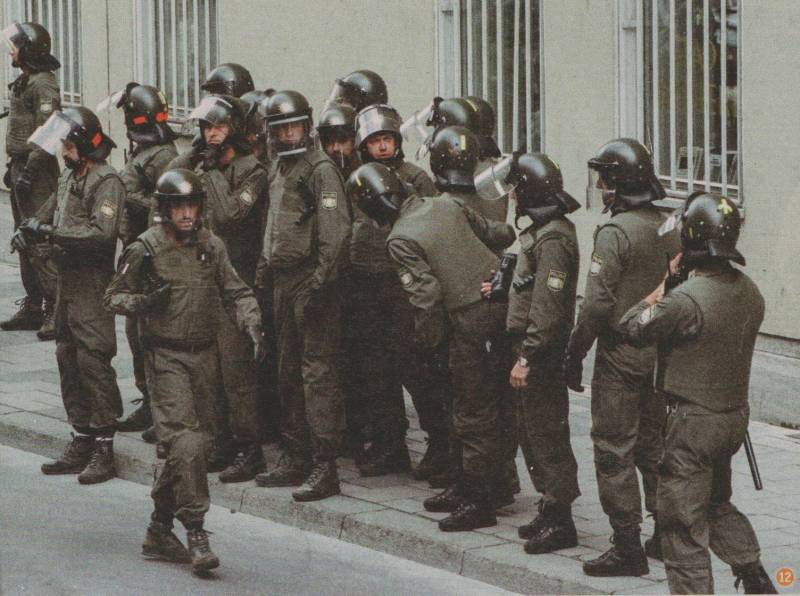
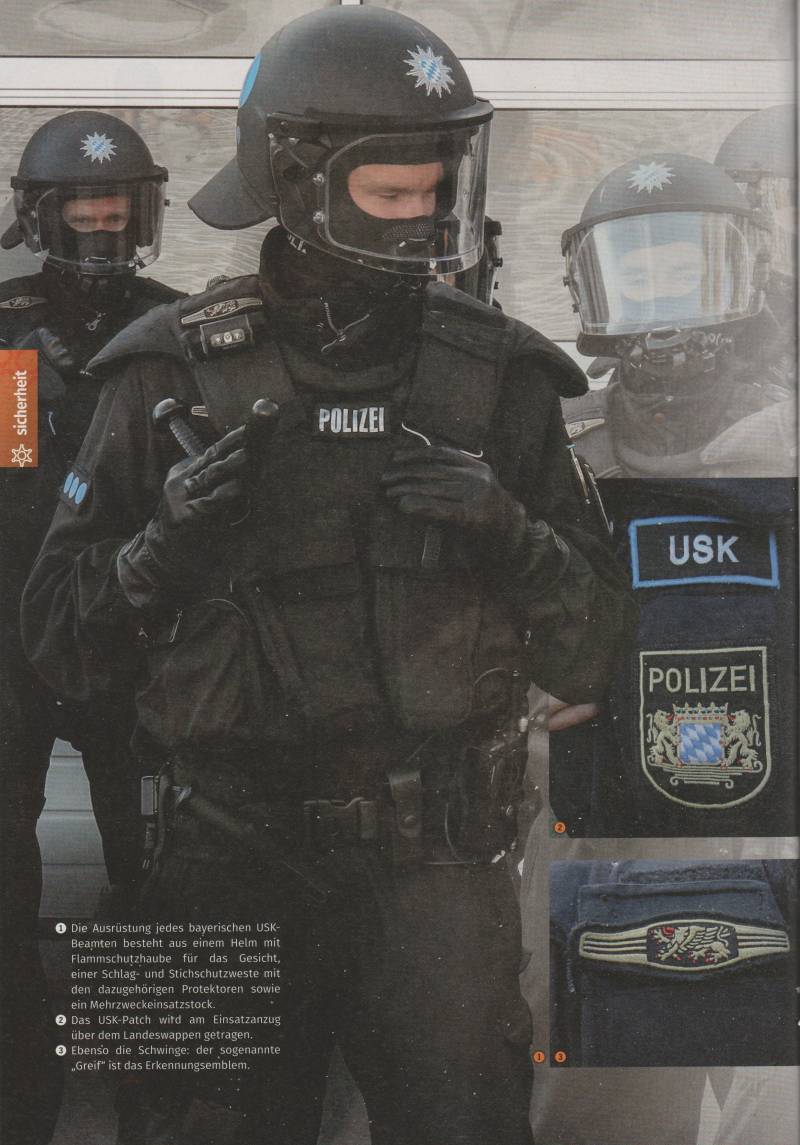
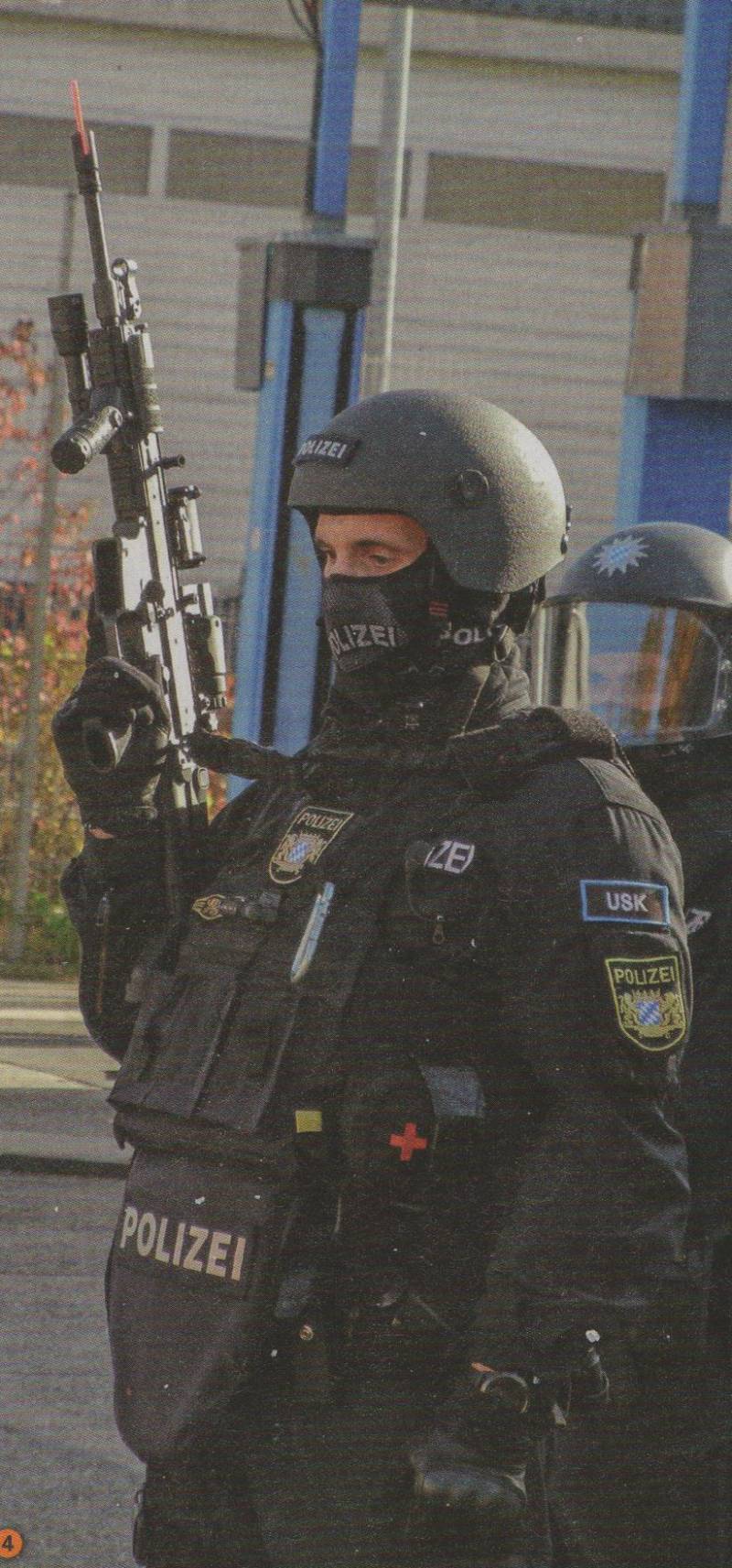
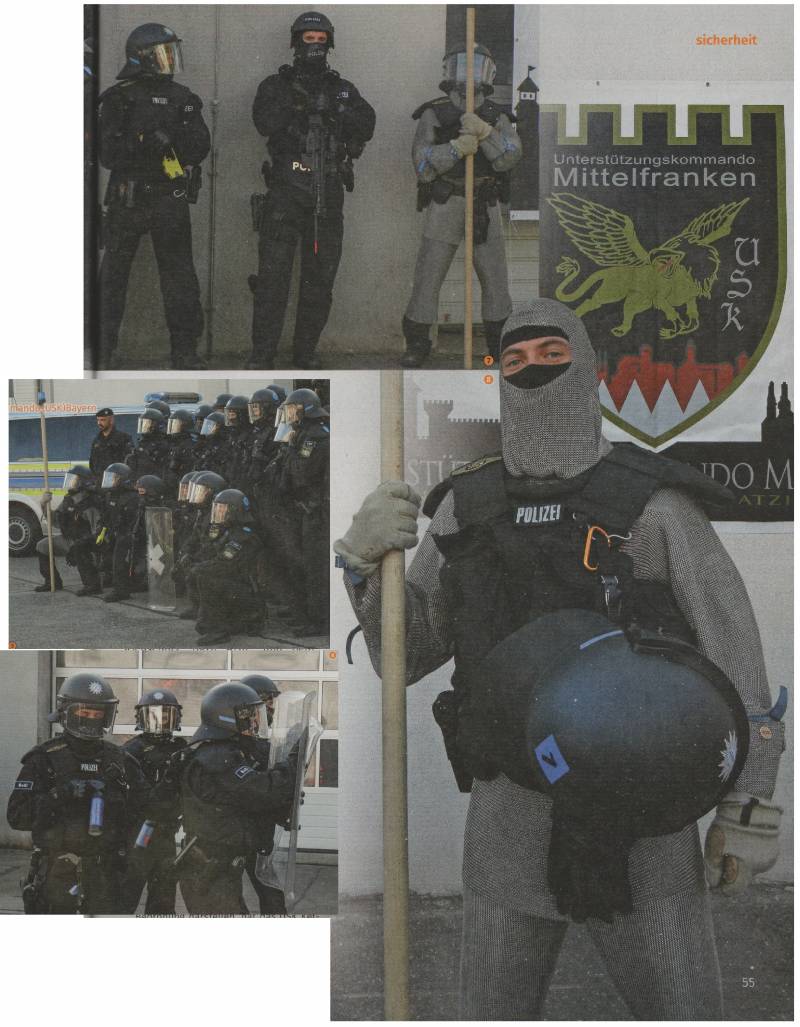
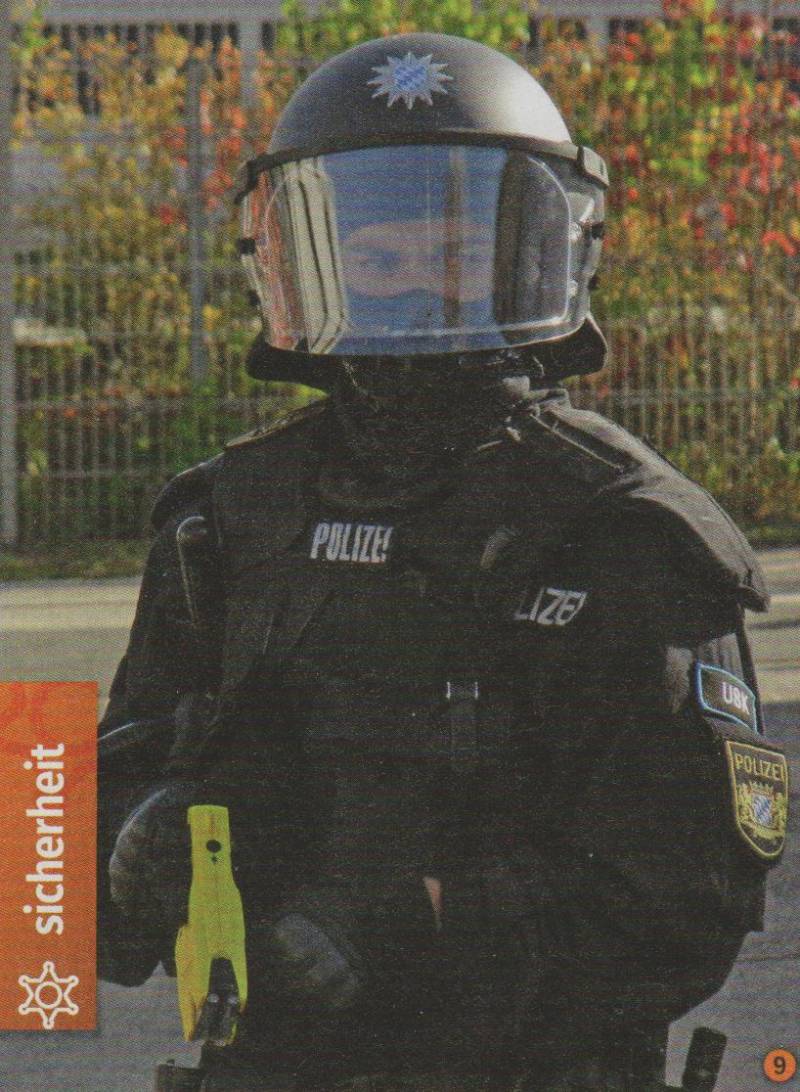
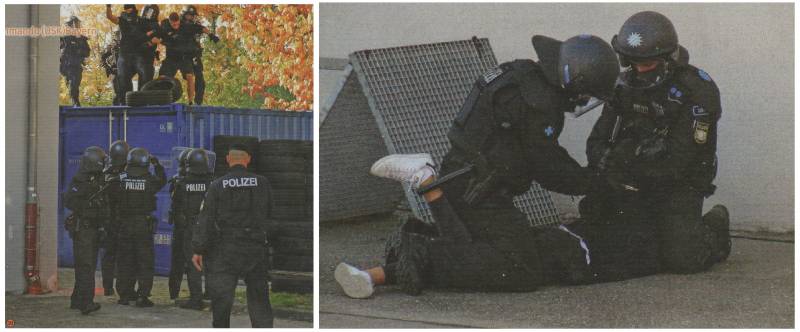
Information